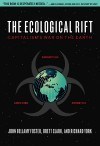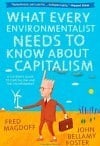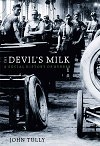Marxist Ecology
It is impossible to exaggerate the environmental problem facing humanity in the twenty-first century. Nearly fifteen years ago one of us observed: “We have only four decades left in which to gain control over our major environmental problems if we are to avoid irreversible ecological decline.” Today, with a quarter-century still remaining in this projected time line, it appears to have been too optimistic. Available evidence now strongly suggests that under a regime of business as usual we could be facing an irrevocable “tipping point” with respect to climate change within a mere decade. Other crises such as species extinction (percentages of bird, mammal, and fish species “vulnerable or in immediate danger of extinction” are “now measured in double digits”);3 the rapid depletion of the oceans’ bounty; desertification; deforestation; air pollution; water shortages/pollution; soil degradation; the imminent peaking of world oil production (creating new geopolitical tensions); and a chronic world food crisis—all point to the fact that the planet as we know it and its ecosystems are stretched to the breaking point. The moment of truth for the earth and human civilization has arrived | more…
The huge increase in oil and other fuel prices over the last few years and a concern that we have reached (or will soon reach) peak oil—after which oil extraction begins to decrease—have created renewed interest in alternative sources of energy. These include solar, wind, ocean wave and tidal flow, geothermal, and biofuels. Sometimes lip service is given to the need for greater energy efficiency, changes in lifestyles (including the ecologically irrational over-reliance on automobiles and living far from one’s job), the need to redesign economic activity from the factory floor to office buildings and homes, and the need for affluent societies to move away from ever higher levels of consumption. However, a radical analysis of actually putting these into effect would lead to questioning the very basics of how capitalism works | more…
The 2007 assessment report by the United Nations Intergovernmental Panel on Climate Change (IPCC) confirms that it is virtually certain that human activities (mainly through the use of fossil fuels and land development) have been responsible for the global warming that has taken place since the industrial revolution. Under current economic and social trends, the world is on a path to unprecedented ecological catastrophes. 1 As the IPCC report was being released, new evidence emerged suggesting that climate change is taking place at a much faster pace and the potential consequences are likely to be far more dreadful than is suggested by the IPCC report | more…
The three water crises—dwindling freshwater supplies, inequitable access to water, and the corporate control of water—pose the greatest threat of our time to the planet and to our survival. Together with impending climate change from fossil fuel emissions, the water crises impose some life-or-death decisions on us all. Unless we collectively change our behavior, we are heading toward a world of deepening conflict and potential wars over the dwindling supplies of freshwater— between nations, between rich and poor, between the public and the private interest, between rural and urban populations, and between the competing needs of the natural world and industrialized humans | more…
The introduction to this book, the last part to be completed, was sent to the printer in New York City only days before the attacks on the World Trade Center on September 11, 2001, and was first published in October 2001 in Monthly Review. Since then the world has witnessed a continuing war by the United States for control of the oil-rich Middle East and an acceleration of the global ecological crisis—symbolized above all by global warming. The opening years of the twenty-first century can therefore be viewed as marking a new stage in the war of capitalism on the planet. | more…

Humanity in the twenty-first century is facing what might be described as its ultimate environmental catastrophe: the destruction of the climate that has nurtured human civilization and with it the basis of life on earth as we know it. All ecosystems on the planet are now in decline. Enormous rifts have been driven through the delicate fabric of the biosphere. The economy and the earth are headed for a fateful collision—if we don’t alter course. | more…

There is a growing consensus that the planet is heading toward environmental catastrophe: climate change, ocean acidification, ozone depletion, global freshwater use, loss of biodiversity, and chemical pollution all threaten our future unless we act. What is less clear is how humanity should respond. The contemporary environmental movement is the site of many competing plans and prescriptions, and composed of a diverse set of actors, from militant activists to corporate chief executives. | more…
Our friends Leo Panitch and Colin Leys, editors of the Socialist Register, have recently published Coming to Terms with Nature: Socialist Register, 2007 (Monthly Review Press, 2006), which includes contributions by a distinguished group of analysts addressing crucial environmental issues—dealing with everything from “fossil capitalism” to eco-localism | more…
I would like to begin my analysis of what I am calling here “the ecology of destruction” by referring to Gillo Pontecorvo’s 1969 film Burn!. Pontecorvo’s epic film can be seen as a political and ecological allegory intended for our time. It is set in the early nineteenth century on an imaginary Caribbean island called “Burn.” Burn is a Portuguese slave colony with a sugar production monoculture dependent on the export of sugar as a cash crop to the world economy. In the opening scene we are informed that the island got its name from the fact that the only way that the original Portuguese colonizers were able to vanquish the indigenous population was by setting fire to the entire island and killing everyone on it, after which slaves were imported from Africa to cut the newly planted sugar cane. | more…

Capital, as Marx once wrote, comes into the world “dripping from head to foot, from every pore, with blood and dirt.” He might well have been describing the long, grim history of rubber. From the early stages of primitive accumulation to the heights of the industrial revolution and beyond, rubber is one of a handful of commodities that has played a crucial role in shaping the modern world, and yet, as John Tully shows in this remarkable book, laboring people around the globe have every reason to regard it as “the devil’s milk.” All the advancements made possible by rubber—industrial machinery, telegraph technology, medical equipment, countless consumer goods—have occurred against a backdrop of seemingly endless exploitation, conquest, slavery, and war. But Tully is quick to remind us that the vast terrain of rubber production has always been a site of struggle, and that the oppressed who toil closest to “the devil’s milk” in all its forms have never accepted their immiseration without a fight. | more…
In late November 2006 John Bellamy Foster traveled to Brazil where he delivered addresses on the global ecological devastation of capitalism, and the need for worldwide ecosocialist resistance, at two universities in the state of Santa Catarina: the Regional University of Blumenau and the Federal University of Santa Catarina in Florianópolis. These talks were part of the third annual Bolivarian Days Conference organized by the Institute of Latin American Studies in Brazil. The theme this year was “Social Theory and Eurocentrism in Latin America: The Insurgency of Critical Thought.” The conference provided ample evidence of the vitality of socialist and anti-imperialist critiques both in Brazil and in Latin America as a whole in what is clearly a new era of revolt | more…
Paul Burkett’s new book, Marxism and Ecological Economics, offers in an outstanding manner evidence of the treasures in Marx’s “Critique of Political Economy” and of the riches of Marxist theory accumulated in more than a hundred years of theoretical reasoning. It is an attempt to bring Marx into the new economic subdiscipline of ecological economics…, and at the same time to reexamine Marxist theory from the perspective of ecological economics.… Burkett’s book aims at correcting…widespread, if not altogether dominant interpretations, which are fundamentally flawed—in both their theoretical understandings of Marxism and their attempts to reduce its influence to certain failed historical experiments. | more…


